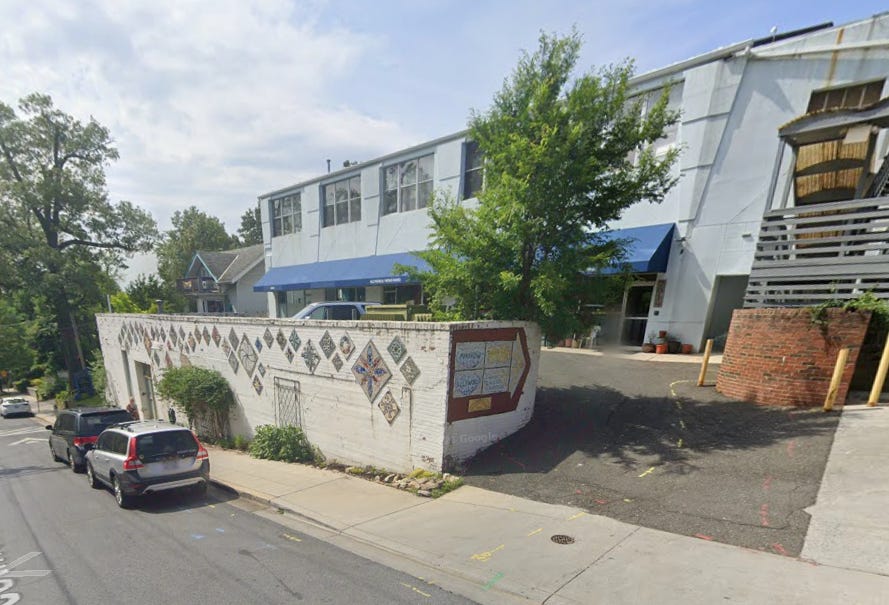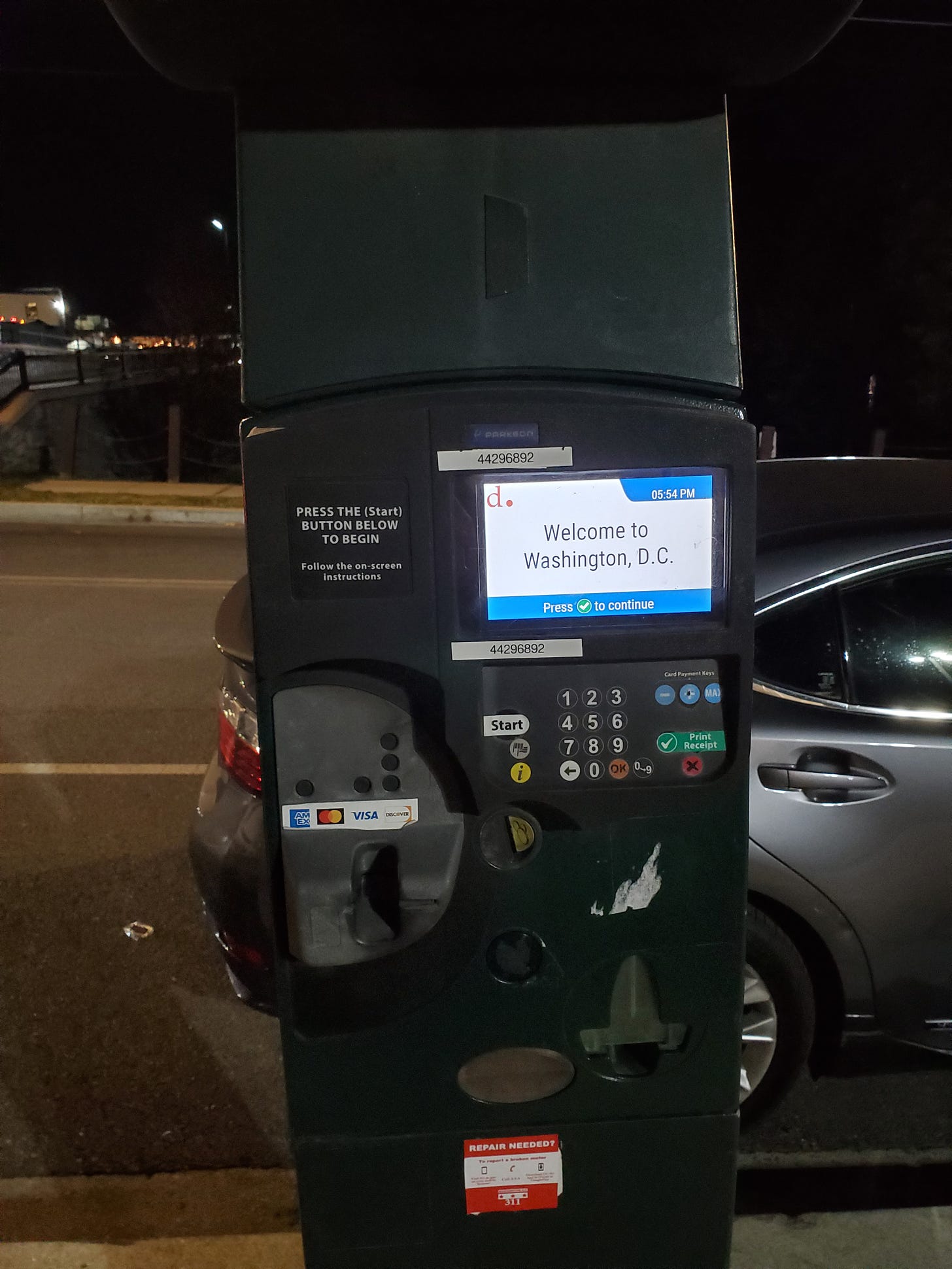Just yesterday I was in Takoma and Takoma Park—both of them—for a book talk with Jerusalem Demsas, one of the great writers on housing and related issues out there. I’ll be writing up my notes from the event, but I ended up with this whole separate bit on my way.
The talk was in Takoma Park, the small Maryland town known for its hippie-ish vibe (it’s a “nuclear-free zone,” for example, and I saw a sticker on a lamppost about animal liberation—that kind of thing) and its NIMBYism. So it was a good place to hold a pro-housing talk.
But, my mistake, I didn’t realize that the little indie bookstore where the event was actually had a tiny free parking lot. A perfect parking lot, really, for a business in a walkable town: just about five spaces tightly nestled into the property.
The bookstore is up the ramp, and the spots are behind that retaining wall. I didn’t even notice this when I scoped out the parking situation on Google Maps, and I didn’t notice it driving by it in the dark.
So I started with a paid spot on the Main Street, but the meters had a pay-by-app sticker and none of them displayed any time left. So even though they were old-school coin meters, I wasn’t sure coins would work. Or how much time they would buy you if they did work, because I only had a few, and I don’t think you can get them back.
So I un-parallel parked and tried the next street, where there was a machine where you could pay and get a little receipt for the dash. That’s better. “Huh, D.C. Parking? I thought we were in Maryland?” I shrugged when I got to the machine, not realizing I’d crossed the D.C. line and was now in the D.C. neighborhood of Takoma. (At least they’re named a tad differently; it’s a good thing my life didn’t depend on identifying which Chevy Chase I was in.)
This was my foe:
Oh, cards! Easy enough. Insert card, take it back, toggle your parking time, and print your receipt. Oh, and I first pulled in to this spot about 5:50 and the paid parking ended at 6:30, so I only needed to pay for 40 minutes. What could possibly go wrong?
Well, this is the worst parking kiosk I have ever seen. This is important, because these are design questions that affect whether people feel like they can go somewhere in the city. Sometimes what I’m doing here is heard as whining, or someone will say, “Easy, don’t take your car into the city!” Sorry—that protective, hazing “if you know, you know” attitude is not helpful.
So. First of all, this machine requires you to insert your card before doing anything else. And then it requires you to choose your parking time. That’s where the trouble started. The button to add time was basically nonfunctional. It needed to be pressed pretty hard and it would only add a minute or two at a time. And then, for a reason I was not able to figure out, it would just close the transaction, charge the currently selected time, and spit out a receipt. This is why you should be able to select your time and generally figure out how the machine works before you have your card in there.
I did this three times and kept accidentally buying 5 or 10 minutes, so about $.75 completely wasted. Would a parking officer count them up and “stack” them? Who knows. Would he show up? Probably not. Knowing you could probably get away with it makes it even more frustrating to do it the right way.
This felt like playing a video game where the controls are wonky and you keep executing or failing to execute a move and you can’t quite figure out what’s causing the character to do or not do a thing. It’s maddening. After the three failed attempts to use a credit card, I switched to coins. Does the machine tell you on a little sticker or something how much the coins buy you? Nope! But at least there’s a button to get the coins back, which I did after putting them all in to see if they got me to 6:30, which they didn’t. Didn’t quarters used to be, like, 15 minutes? Two quarters and three dimes wouldn’t buy me 40 minutes here.
Then I tried the card again but added a coin, to see if all my coins plus the 10 minutes I kept accidentally buying would get me to 6:30. Can you add coins once you’ve begun with a card? Nope! Oh, bills! That would be a lot easier. Does the machine take dollar bills? Nope!
At this point, I was no longer early for the event, and I’d been standing in the cold and dark on a side street for 10 minutes screwing with a broken and/or Soviet-made parking machine. Sure, it’s kind of funny, especially when I’m the guy who should maybe have tried transit instead or whatever, but still. So, one more time with the card. It seemed as though maybe selecting time and then pausing for a few seconds was triggering the transaction to close, so I kept applying pressure to the add-time button.
I stood there pressing the damn button for probably 20 seconds until my finger was sore, one excruciating minute at a time, hoping it wouldn’t decide to charge me with five minutes to go. (Another design point—go for watertight push-buttons, like a touch-tone phone, not this awful microwave-style button panel with no feedback; you can’t even tell if the button is actuating or not.)
With only enough time to rush to the bookstore before the event started, I put my receipt on the dash and ran. Grand total even with the triple charges? About $2.50.
It’s important to note that none of this is about money. I’m all for charging for on-street parking. It’s an easy way to raise a bit of revenue and also keep the curbs from filling up all the time. If a spot had been $5, or even $10, I would have grumbled, paid, and gone on my way in 30 seconds. It absolutely should not have taken 10 minutes and three accidental charges to pay my two bucks and leave my car on a half-empty street. If I was doing something “wrong” with the machine, then it was completely unintuitive.
This sort of unnecessary and maddening friction—a problem where there just shouldn’t be one—is a much bigger factor, I think, in people disliking cities than things like taxes or crime. High taxes for poor services, or poor public safety, are real problems. But this low-hanging fruit that really wouldn’t take much to fix would be such a relief. It would lift that feeling that if you don’t live in the city, it’s not a place you can easily get to. You start to think maybe you’re being messed with. Even I have to resist this feeling.
There should be a set of best practices for paid parking. I’ve seen so many systems—kiosks that require you to enter your license plate and spot number (hope the spot number isn’t half worn away), ones that are pay by app (that’s when I realize the memory on my phone is too full to install a new app), ones where you have to remember your zone. Keep your ticket with you, keep your ticket in the car, etc. Once a machine failed to read my ticket and wouldn’t lift the gate, and I was literally almost trapped in the garage.
There are real costs to free parking everywhere—land, lost revenue, gaps between worthwhile things, a land-use pattern that privileges driving and penalizes any other way of getting around. The opposite of that might be making parking more scarce and more expensive. But it isn’t and can’t be making it more difficult, time-consuming, and frustrating. Paying for parking in most places involves a series of psychological efforts, little frustrations, little panic-inducing questions. It’s not about the money. If cities could make it just about the money, we’d all be better off.
Related Reading:
Your (and More) Thoughts on Parking Anxiety
Expressway is as Expressway Does
Thank you for reading! Please consider upgrading to a paid subscription to help support this newsletter. You’ll get a weekly subscribers-only piece, plus full access to the archive: over 1,100 pieces and growing. And you’ll help ensure more like this!






It's not just that kiosk! They're like this all over town. This happens to me every single time.
It's like the scene with the CD in Lulu on the Bridge.
Some kind of E-Z Pass system for street parking would seem like low-hanging fruit in the year 2024.
People say they hate to parallel-park, but I hate this sort of thing even more. Make paid parking EASY and it becomes a money-maker, rather than driving people away because “there’s no parking there.”